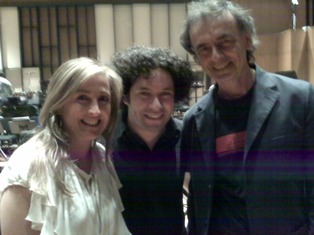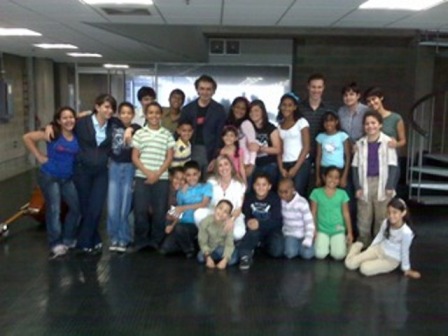Click here for Part Six
Caracas, 15 de abril
Last two days of classes! With the concert on Saturday, We’ve decided to allow the children to work until Friday afternoon. This is risky, because in order to get this many pieces ready in legible form for professional musicians to read easily, means that all the prep work will have to be done Friday way into the night and the rehearsal Saturday morning. At first the rehearsal is set for two hours, but we push for at least three. It seems like, well, children’s pieces–how difficult could they be? I tell them that for five children’s works, we usually allot two hours of rehearsal and it’s never enough. And here, we have 29 works to perform. Is this even possible, then? I don’t know.
But the pace of composing and concentration is picking up. The mood become tense. Perhaps one of the catalysts is me losing my temper: I like to be calm and supportive, but at one point one of the students is having her latest draft demonstrated by several of us. As we are performing her work, I notice she is taking a cell phone call.
Uh-oh.
Don’t ever, ever do that with me, or probably with any teacher, anywhere. And we’re not talking about an “assignment” here: We’re talking about a “Work of Art.” (And this piece happened to be quite a good one.)
I explode: “this is a work of Art! ART!! Doesn’t that mean anything to you? These are not children’s games! If you want children’s games, please go elsewhere! You, all of you, are creating wonderful musical art that has never existed before in the world! Be proud of what you’ve done! I didn’t come down here for anything less!” Silence. This time, no one is laughing at my grammatical errors. The rest of the class goes quite well.
And Friday’s classes: by now, everyone is working quietly, intently, in the corners of rooms. Diana is beginning to transcribe several works into software. Pedro has truly begun to take leadership in keeping kids on task. Rosa is playing parts on her violin, and kids are solfege-ing harmonic lines. Dani is circulating, translating, giving support, and Richard has a group at his feet, working hard.
Twenty minutes before the end of the final class, there is an atmosphere of celebration: the works are finished, in whatever form finished happens to be. Hugs all around, pictures, autographs, final frantic last minute changes.
We are still not 100% clear about Irawo’s, Gabriél’s and David’s scores. Alejandra has really caught fire and begs to be allowed to continue to write tonight. Against my better judgment, I allow her to do so. Her piece is turning out so well, I am quite taken by it. She hadn’t been able to write anything for all this time up to now. What can you do? Life is not perfect. Only art transcends. It is distinctly not “professional” to allow a composer to continue writing up until the day of the concert, child or no. But I do not find it in me to stop her in full flight.
Some of these works will not get a full, proper performance tomorrow. But will we come close enough? Much will depend on the performers.
And even more on whether Pedro, Richard, Rosa and I can get it all down in its exact and readable form tonight. We are clearly going to have to pull an all-nighter.
Wish us all luck!
–Jon Deak
Click here for Part Eight
**************************************************************************************************************
Jon Deak, born in the sand dunes of Indiana of East European parents, is a Composer, Contrabassist, and Educational pioneer. Educated at Oberlin College, the Julliard School, the Conservatorio di Santa Cecilia (Rome) and the University of Illinois, he joined the New York Philharmonic and served as its Associate Principal Bassist for many years, while continuing his professional composing, and studying with Pierre Boulez and Leonard Bernstein. During this time he also introduced ground-breaking performance techniques for the Contrabass, and in his orchestral writing, working with major orchestras across the country.
From 1994 – 97 he served as Composer In Residence (sponsored by Meet the Composer) with the Colorado Symphony under Marin Alsop, which is where he initiated the public school program now called The Very Young Composers (VYC).
With support from the New York Philharmonic and others, the VYC has grown steadily, winning a national award for excellence in 2004. The program has been introduced in Shanghai, Tokyo, and now in Venezuela, besides serving hundreds of children in eleven New York area Public Schools and such places as New England and Eagle County, Colorado. The New York Philharmonic has premiered 42 works for children, fully orchestrated by the children themselves, mostly under the ages of 13, as well as hundreds of chamber works in the public schools and libraries.
**************************************************************************************************************

Daniela Bedoni, Guztavo Dudamel, and Jon Deak

Daniela Bedoni, Richard Mannoia, and Jon Deak with children from El Sistema